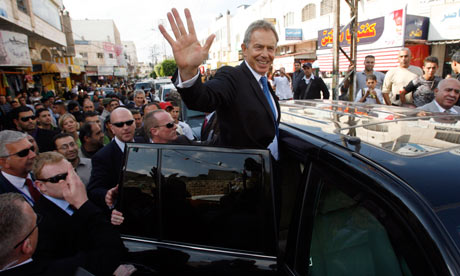Tony Blair criticised for 'Israeli bias'
 Leaked papers show Palestinians feel quartet envoy is paternalistic and that Israelis don't take him seriously
Leaked papers show Palestinians feel quartet envoy is paternalistic and that Israelis don't take him seriously
Tony Blair criticised for 'Israeli bias'
Leaked papers show Palestinians feel quartet envoy is paternalistic and that the Israelis don't take him too seriously

Tony Blair, envoy of the Middle East quartet, was attacked by Palestinian officials for being biased in favour of Israeli security needs and seeming "to advocate an apartheid-like approach to dealing with the occupied West Bank", the Palestine papers reveal.
The former prime minister, appointed to the job in September 2007, made the American Colony hotel in East Jerusalem his base for efforts to boost the West Bank economy and improve Palestinian governance – key strands of the overall western strategy of backing the Palestinian Authority and shunning Hamas during negotiations with Israel.
He encountered little of the hostility he faced in Britain or the Arab world over the war in Iraq but met resistance when his initial plans for development projects were scorned for ignoring the realities of occupation and prioritising Israel's security over Palestinian economic needs."The overall tone, without making any judgment as to intent, is paternalistic and frequently uses the style and jargon of the Israeli occupation authorities," complained a memo by the PA's negotiations support unit reviewing his proposals. "Some of the terms (eg 'separate lanes' and 'tourist-friendly checkpoints') are unacceptable to Palestinians."
In February 2008, Blair is recorded as telling the quartet – made up of the UN, US, EU and Russia – that he has a good relationship with Israel's defence minister, Ehud Barak. But he warns that the current approach to the Gaza Strip – under siege since the Hamas takeover – "is wrong and needs to change immediately". Blair found it "discouraging" that there had been no progress since the Annapolis conference, and feared "bad consequences". But a Russian diplomat present at the meeting "got the impression that Blair was talking like Bush's representative".
Blair agreed with Salam Fayyad, the PA's prime minister, on the need to "pacify and stabilise Gaza so that it does not destabilise us: that means ceasefire, opening crossings, engaging Egypt to play a role."Israel needed to be encouraged to make confidence-building measures to "stabilise and improve the situation in the West Bank". Policy and presentation were closely linked. "In order to have impact, we need radical changes and we need them to be broadcast and announced," Blair was quoted as saying.
The papers underscore Blair's quartet role as a high-level middleman, interceding with the Israelis to remove roadblocks, improve movement and access in the West Bank, seek approval for projects and co-ordinate with the US to press for the deployment of PA security forces. He also passed messages to the Palestinians, including concerns of Israel's Shin Bet security service about the too-speedy release of prisoners.
But there are signs that the Israelis did not take him too seriously, while PA officials were scathing about his "offensive" language and acceptance of Israeli and US assumptions.
One draft document refers to a demand by the quartet that Israel should not bomb a project Blair is involved with. "Israel must assure it will spare site military action," the quartet reference reads. The tone of the Palestinian response is angry: "Are they serious? We will implicitly condone criminal acts against civilian targets but please make sure you don't harm investor interest."
Saeb Erekat, the Palestine Liberation Organisation's chief negotiator, suggested the British envoy was not as influential as he liked to suggest. "Tony Blair goes and says he got Israel to remove a roadblock in Jericho," Erekat said in 2009. "It was [Israeli defence ministry official Eitan] Dangot who removed it because I asked him. It was not Blair or [US defence official Paul] Selva."
The most striking comment from Blair, after doing the job for a few months, was that US attitudes to Israel were changing. "[There is] no longer unconditional support for Israel," he told Fayyad. "Many asked me whether Israel was doing all it can to help; no one asked that last year. Also, bear in mind that, for the American audience, your [Palestinian] unequivocal condemnation of violence is what is critical to letting them listen to you."Arab and Saudi money particularly, he promised, would be more forthcoming if there were visible changes on the ground. "If you have problems in funding I can talk to some people."
Blair offered to ask Gordon Brown to take part in an investment conference in Bethlehem, designed to showcase the potential of tourism to the West Bank economy. Brown did go and Blair lauded the event as a success.
